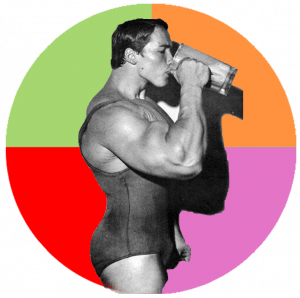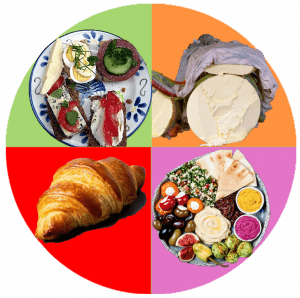If I say the words “sports nutrition”, what do you think? For many of us, the predominant image is probably a guy a bit like Arnie, downing a protein shake, wearing tight nylon short-shorts and a slinky vest. Fear not, I’m here to tell you that we can have a far more expansive view of what constitutes sports nutrition. In fact, as far as I’m concerned, anything that you put in your mouth which contributes to your training programme is, in essence, sports nutrition.
If a cup of herbal tea before bed helps you get a good night’s sleep then it is, to you, as important a sports nutrition drink as a protein shake is to Arnie! Nutrition doesn’t have to be prescriptive – a good nutrition programme is about listening to your body and responding to what it needs: if you are hungry then eat and if you are full then stop. There are a few basic points to consider which can help you hit the basics but, generally speaking, being incredibly precise about your food intake is not necessary unless you are an elite athlete training multiple times per day.

A good way to illustrate this is to think about how much human diets vary between different people and cultures around the world. The most energy-dense (high-calorie) food in a traditional Tibetan diet, for example, is yak’s milk, whereas a West African diet is dominated by cereal grains and vegetables. what is understood to be a traditional Nordic diet prioritises wholegrain breads and oily fish, while French diets commonly favour smaller portions of foods, eaten more often, such as wine, white bread and cheese – foods considered ‘unhealthy’ by industry standards in the UK.
And yet all of these diets have at one time been associated with longevity and good functional health. The reason behind this flexibility is that all of the big macronutrients – carbohydrates, fats and protein – are based around a similar molecular structure: they are all varying configurations of carbon and hydrogen chains. Our bodies have evolved to have an incredible ability to turn each form of these chains into whatever building blocks needed in the body to repairing muscle, build tissues or do whatever else it is that we need.

This isn’t to say that what we eat doesn’t matter – we’ll be looking in more detail at this next time. But there’s a real danger that if we start taking ‘sports nutrition’ more seriously, without a good understanding of what nutrition is, and how it differs for us each as individuals, for example by counting calories and pursing very precise and perfect carbohydrate-protein ratios, we run the risk of over-complicating our regime or becoming obsessive and anxious about the food we eat.
So the message from me is: don’t overcomplicate it. Listen to your body and experiment with different foods and food regimes in order to figure out which ones best help you train and recover. Aim to eat a range of foods, include lots of fresh, wholefood ingredients, rather than relying on the numbers.
Next time, I’m going to give you some breakfast ideas to set you up for your training, with recipes which will fit into the easy, cheap, nutritious and delicious Wheel of Food Happiness.
Written by Tim Hinson
Resident Chef at The Pavilion
Coombe Dingle Sports Complex
